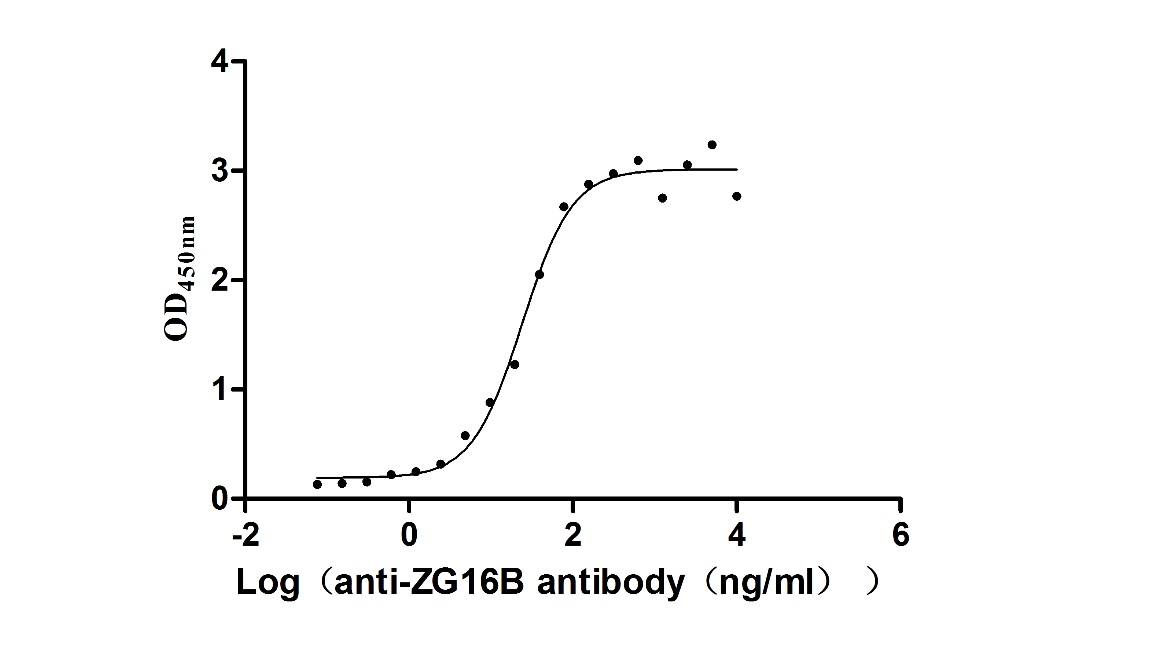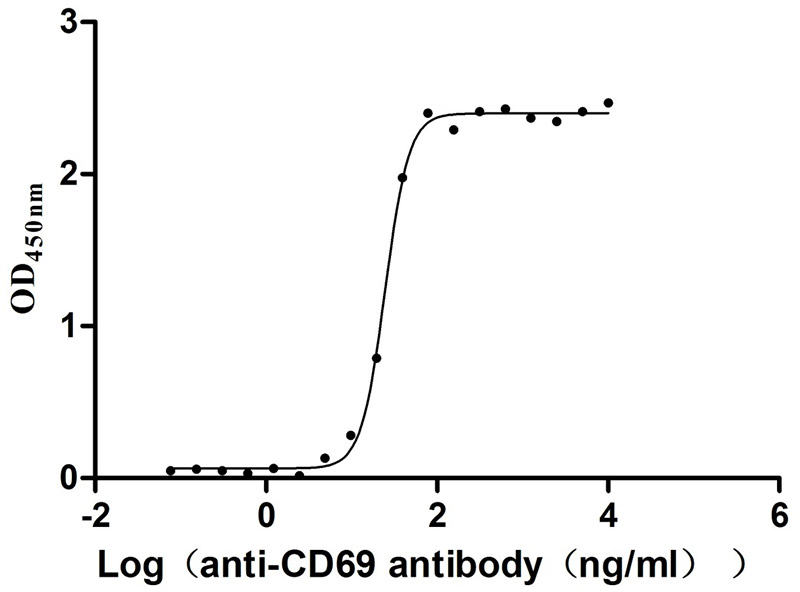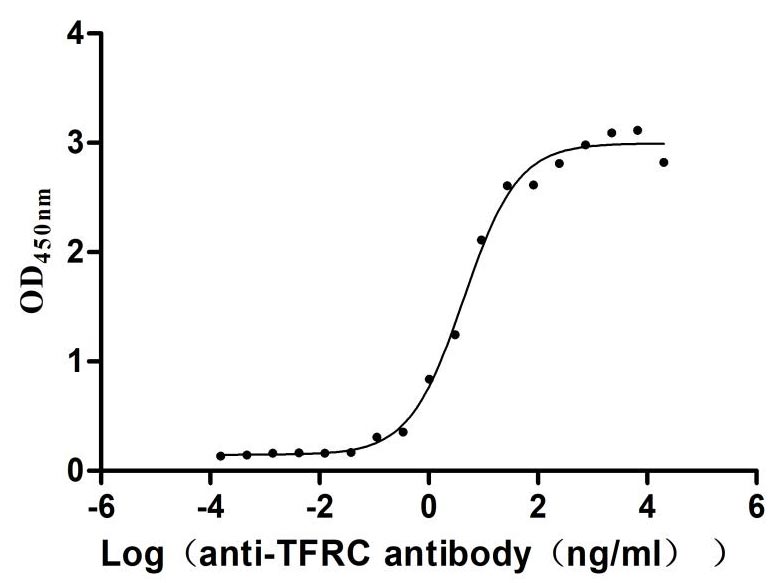Recombinant Human Transforming growth factor-beta-induced protein ig-h3 (TGFBI)
-
货号:CSB-YP618988HU
-
规格:
-
来源:Yeast
-
其他:
-
货号:CSB-EP618988HU
-
规格:
-
来源:E.coli
-
其他:
-
货号:CSB-EP618988HU-B
-
规格:
-
来源:E.coli
-
共轭:Avi-tag Biotinylated
E. coli biotin ligase (BirA) is highly specific in covalently attaching biotin to the 15 amino acid AviTag peptide. This recombinant protein was biotinylated in vivo by AviTag-BirA technology, which method is BriA catalyzes amide linkage between the biotin and the specific lysine of the AviTag.
-
其他:
-
货号:CSB-BP618988HU
-
规格:
-
来源:Baculovirus
-
其他:
-
货号:CSB-MP618988HU
-
规格:
-
来源:Mammalian cell
-
其他:
产品详情
-
纯度:>85% (SDS-PAGE)
-
基因名:TGFBI
-
Uniprot No.:
-
别名:RGD containing collagen associated protein; AI181842; AI747162; Beta ig; Beta ig h3; Beta ig-h3; BGH3_HUMAN; Big h3; BIGH3; CDB1; CDG2; CDGG1; CSD; CSD1; CSD2; CSD3; EBMD; Kerato epithelin; Kerato-epithelin; LCD1; MGC150270; RGD CAP; RGD-CAP; RGD-containing collagen-associated protein; TGFBI; TGFBI transforming growth factor, beta induced, 68kDa; Transforming growth factor beta induced protein ig h3; Transforming growth factor-beta-induced protein ig-h3
-
种属:Homo sapiens (Human)
-
蛋白长度:Full Length of Mature Protein
-
表达区域:24-683
-
氨基酸序列GPAKSPY QLVLQHSRLR GRQHGPNVCA VQKVIGTNRK YFTNCKQWYQ RKICGKSTVI SYECCPGYEK VPGEKGCPAA LPLSNLYETL GVVGSTTTQL YTDRTEKLRP EMEGPGSFTI FAPSNEAWAS LPAEVLDSLV SNVNIELLNA LRYHMVGRRV LTDELKHGMT LTSMYQNSNI QIHHYPNGIV TVNCARLLKA DHHATNGVVH LIDKVISTIT NNIQQIIEIE DTFETLRAAV AASGLNTMLE GNGQYTLLAP TNEAFEKIPS ETLNRILGDP EALRDLLNNH ILKSAMCAEA IVAGLSVETL EGTTLEVGCS GDMLTINGKA IISNKDILAT NGVIHYIDEL LIPDSAKTLF ELAAESDVST AIDLFRQAGL GNHLSGSERL TLLAPLNSVF KDGTPPIDAH TRNLLRNHII KDQLASKYLY HGQTLETLGG KKLRVFVYRN SLCIENSCIA AHDKRGRYGT LFTMDRVLTP PMGTVMDVLK GDNRFSMLVA AIQSAGLTET LNREGVYTVF APTNEAFRAL PPRERSRLLG DAKELANILK YHIGDEILVS GGIGALVRLK SLQGDKLEVS LKNNVVSVNK EPVAEPDIMA TNGVVHVITN VLQPPANRPQ ERGDELADSA LEIFKQASAF SRASQRSVRL APVYQKLLER MKH
-
蛋白标签:Tag type will be determined during the manufacturing process.
The tag type will be determined during production process. If you have specified tag type, please tell us and we will develop the specified tag preferentially. -
产品提供形式:Lyophilized powder
Note: We will preferentially ship the format that we have in stock, however, if you have any special requirement for the format, please remark your requirement when placing the order, we will prepare according to your demand. -
复溶:We recommend that this vial be briefly centrifuged prior to opening to bring the contents to the bottom. Please reconstitute protein in deionized sterile water to a concentration of 0.1-1.0 mg/mL.We recommend to add 5-50% of glycerol (final concentration) and aliquot for long-term storage at -20℃/-80℃. Our default final concentration of glycerol is 50%. Customers could use it as reference.
-
储存条件:Store at -20°C/-80°C upon receipt, aliquoting is necessary for mutiple use. Avoid repeated freeze-thaw cycles.
-
保质期:The shelf life is related to many factors, storage state, buffer ingredients, storage temperature and the stability of the protein itself.
Generally, the shelf life of liquid form is 6 months at -20°C/-80°C. The shelf life of lyophilized form is 12 months at -20°C/-80°C. -
货期:Delivery time may differ from different purchasing way or location, please kindly consult your local distributors for specific delivery time.Note: All of our proteins are default shipped with normal blue ice packs, if you request to ship with dry ice, please communicate with us in advance and extra fees will be charged.
-
注意事项:Repeated freezing and thawing is not recommended. Store working aliquots at 4°C for up to one week.
-
Datasheet :Please contact us to get it.
相关产品
靶点详情
-
功能:Plays a role in cell adhesion. May play a role in cell-collagen interactions.
-
基因功能参考文献:
- These results suggest that suppression of osteoblast differentiation by BIGH3 is one of the mechanisms that enhance osteolytic lesions in RCC bone metastasis, and raise the possibilty that treatments that increase bone formation may improve therapy outcomes. PMID: 29190493
- High TGFBI expression was significantly associated with poor prognosis and cancer progression. Downregulation of TGFBI in the cocultured gastric fibroblasts inhibited the invasion and migration abilities of the GC cells. PMID: 30260476
- Expression array analysis identified TGFBI as a key gene for the acquisition of malignant phenotype of pancreatic ductal adenocarcinoma (PDAC), and the expression of TGFBI was associated with poor prognosis in patients with PDAC. PMID: 30156359
- the genetic screening of TGFBI mutations must be incorporated into the pre-operative screening procedures to prevent exacerbation and recurrence, which eventually could lead to the need for a corneal transplant. PMID: 29192679
- Structural and functional implications of TGFBIp mutations in corneal dystrophies have been reported. PMID: 28988748
- Induction of TGFBI promotes prostate cancer growth and metastasis and can be caused by dysregulation or therapeutic inhibition of androgen receptor signaling. PMID: 28811384
- betaig-h3 in DPCs may be involved in reparative dentin formation and that its expression is likely to negatively regulate this process. PMID: 28292713
- This is the first molecular analysis of TGFBI and CHST6 in Turkish patients with different types of corneal dystrophies. PMID: 27829782
- The more structurally organized A546T and V624M mutations in FAS1-4 domain of TGFBI had reduced deamidation rates, suggesting that a folded and stable FAS1-4 domain precludes Asn622 deamidation. PMID: 29140698
- A novel heterozygous TGFBI mutation was identified in the proband, c.1673T>G in exon 12 that leads to (Leu558Arg) change at the protein level. PMID: 27028151
- TGFBI and periostin act similarly in the heart in affecting fibrosis and disease responsiveness. PMID: 28750100
- The p.(Val113Ile) mutation results in an alteration of the atypical LCD phenotype associated with the p.(Leu558Pro) mutation. This represents only the second report of the alteration of the phenotype of a TGFBI dystrophy by a second, non-homozygous pathogenic mutation, and thus provides insight into the phenotype-genotype correlation of the TGFBI dystrophies. PMID: 27402970
- Our findings demonstrate that granular corneal dystrophy type 1 may present with a vortex pattern of anterior stromal deposits. Although this pattern of dystrophic deposits is not recognized by clinicians as a typical phenotype of GCD1, it is consistent with the production of the majority of the TGFBI protein by the corneal epithelium. PMID: 28060069
- The right cornea showed a higher number of lattice lines than the left cornea. Molecular analysis involving bidirectional complete sequencing demonstrated a novel T621P mutation in exon 14 of TGFBI. PMID: 27163623
- LASIK surgery of granular corneal dystrophy type 2 patients leads to accumulation and differential proteolytic processing TGFBI protein. PMID: 26864644
- High TGFBI expression in Esophageal squamous cell carcinoma is associated with hematogenous recurrence. PMID: 25448803
- Vicenin-2 and scolymoside could be a potential therapeutic agent for treatment of various severe vascular inflammatory diseases via inhibition of the TGFBIp signaling pathway. PMID: 26084452
- We observed that knockdown of Cul4A was associated with increased sensitivity to gemcitabine through upregulation of TGFBI in lung cancer cells. PMID: 26503734
- Data suggest that periostin and TGFBI (transforming growth factor-beta induced protein) can be considered paralogs in some ways: structural homology, phylogeny, and functions in extracellular matrix formation/cell adhesion/cellular immunity. [REVIEW] PMID: 26288337
- No mutations were detected in the TGFBI gene in Korean patients with macular corneal dystrophy. PMID: 26604660
- TGFBIp functions as a pro-lymphangiogenic factor.TGFBI is a lymphangiogenic factor contributing to tumor dissemination PMID: 25772247
- Studies reveal that growth hormone (GH)increases TGFBI expression in a mouse and rat models of diabetic nephropathy (DN) which correlate with clinical results, and suggest that this mechanism can explain the podocytes depletion in DN. PMID: 25740786
- the functional role of H3K4me in TGFbeta1-mediated TGFBIp and ECM gene expression in corneal fibroblasts PMID: 26553048
- 19 novel TGFB1 regulatory region and exon 1 alleles are presented: p018-p036. p018, p019, and p020 are formed by novel combinations of known polymorphic positions. Another 16 novel alleles are shown to carry additional known and unknown SNPs. PMID: 25808355
- The p. Arg555Trp mutation of the TGFBI gene was associated with Thiel-Behnke corneal dystrophy, which revealed a novel phenotype-genotype correlation within the mutational spectrum of phenotypically diverse corneal dystrophies. PMID: 26464103
- that locally generated TGFBIp at either wounds or tumor sites may contribute to differentiation and angiogenic function of endothelial progenitor cells by augmenting the recruitment of endothelial progenitor cells PMID: 25786978
- TGFBI functions as a promoter of certain gastrointestinal tract cancers. PMID: 25889002
- The s present a unilateral variant of late-onset LCD with a heterozygous Pro501Thr mutation in the TGFBI gene. PMID: 23884333
- insights on TGFBIp trafficking PMID: 25853243
- TGFBI plays an important role in the progression of colorectal cancers PMID: 25755764
- Betaig-h3 protein expressed distinctly in gastric cancer peritoneal metastasis. PMID: 25864756
- The results support a novel inflammatory pathway for diabetic retinopathy. This pathway is initiated by TGFbeta released from macrophages, which promotes synthesis and release of BIGH3 protein by REC and REC apoptosis. PMID: 25378215
- Silencing of DDR1 inhibited tumor cell growth and motility, and induced TGFBI expression, both in vitro and in vivo. PMID: 25369402
- A de novo R124C mutation of the TGFBI gene may occur in one of dizygotic twins. Patients with an R124C mutation may have clinical features like corneal dystrophy of the Bowman layer. PMID: 25785536
- The patient in this reprot showed typical asymmetric ndulinear stromal opacity in both corneas, and an L527R mutation in the TGFBI gene with two SNP mutations. PMID: 24505203
- We present the characteristics and surgical treatment of corneas with a novel A620P mutation in TGFBI showing lattice corneal dystrophy type IIIA with hyaline component. PMID: 25321938
- Granular corneal dystrophy type II can co-exist with keratoconus and should be included in the differential diagnosis. PMID: 24582869
- TGFBI is a potential risk gene for human diabetes. PMID: 24728038
- a small difference in thermodynamic stability introduced by the P551Q mutation most likely causes structural changes of TGFBIp. PMID: 24302499
- The TGFBI gene, that is responsible for lattice corneal dystrophy type 1, is expressed above all by the corneal epithelial cells but also by the keratocytes PMID: 25055147
- Integrins alphavbeta5 and alphavbeta3 both control myofibroblast differentiation by activating latent TGF-beta1 PMID: 24639195
- These results reveal betaig-h3 enhances the metastasis potentials of human osteosarcoma cells via integrin alpha2beta1-mediated PI3K/AKT signal pathways. PMID: 24595049
- This study improves the knowledge of the genetic features of Mexican patients with corneal stromal dystrophies by identifying mutations in the TGFBI, CHST6, and GSN genes. PMID: 24801599
- Pin1 induction during liver fibrosis is involved in hepatic stellate cell activation, TGFbeta1 expression, and TGFbeta1-mediated fibrogenesis signalling. PMID: 24530597
- The H19-miR-675 axis acts as a suppressor of prostate cancer metastasis via modulation of TGFBI expression. PMID: 24988946
- Induced BIGH3 expression upon BM stress may contribute to the regulation of BM homeostasis PMID: 24152593
- A novel heterozygous missense mutation p.Leu565Pro was identified in exon 13 of the TGFBI gene. PMID: 24473223
- TGFBI dysregulation could occur in HBV-related HCC development. PMID: 24662304
- TGFBI is required for melanoma metastatic outgrowth; knockdown does not interfere with melanoma cells' dissemination to the lung PMID: 24499734
- Circulating levels of TGFBIp were significantly elevated in septic patients compared with healthy controls, and were strongly correlated with disease severity. TGFBIp enhanced vascular proinflammatory responses through interacting with integrin alphavbeta5. PMID: 24506343
显示更多
收起更多
-
相关疾病:Corneal dystrophy, epithelial basement membrane (EBMD); Corneal dystrophy, Groenouw type 1 (CDGG1); Corneal dystrophy, lattice type 1 (CDL1); Corneal dystrophy, Thiel-Behnke type (CDTB); Corneal dystrophy, Reis-Bucklers type (CDRB); Corneal dystrophy, lattice type 3A (CDL3A); Corneal dystrophy, Avellino type (CDA)
-
亚细胞定位:Secreted. Secreted, extracellular space, extracellular matrix.
-
组织特异性:Highly expressed in the corneal epithelium. Expressed in heart, placenta, lung, liver, skeletal muscle, kidney and pancreas.
-
数据库链接:
HGNC: 11771
OMIM: 121820
KEGG: hsa:7045
STRING: 9606.ENSP00000416330
UniGene: Hs.369397
Most popular with customers
-
Recombinant Human Tumor necrosis factor ligand superfamily member 8 (TNFSF8), partial (Active)
Express system: Mammalian cell
Species: Homo sapiens (Human)
-
Recombinant Mouse Desmoglein-3 (Dsg3), partial (Active)
Express system: Mammalian cell
Species: Mus musculus (Mouse)
-
Recombinant Human Claudin-6 (CLDN6)-VLPs, Fluorescent (Active)
Express system: Mammalian cell
Species: Homo sapiens (Human)
-
Recombinant Human Glucagon-like peptide 1 receptor (GLP1R), partial (Active)
Express system: Mammalian cell
Species: Homo sapiens (Human)
-
Recombinant Human Dickkopf-related protein 1 (DKK1) (Active)
Express system: Mammalian cell
Species: Homo sapiens (Human)
-
Recombinant Macaca fascicularis zymogen granule protein 16 homolog B (ZG16B) (Active)
Express system: Mammalian cell
Species: Macaca fascicularis (Crab-eating macaque) (Cynomolgus monkey)
-
Recombinant Human Early activation antigen CD69 (CD69), partial (Active)
Express system: Mammalian cell
Species: Homo sapiens (Human)
-
Recombinant Human Transferrin receptor protein 1 (TFRC), partial (Active)
Express system: Mammalian cell
Species: Homo sapiens (Human)


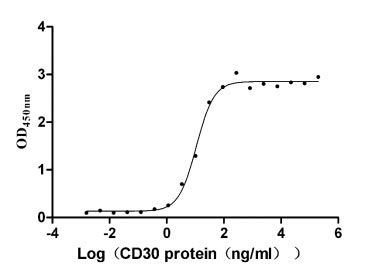
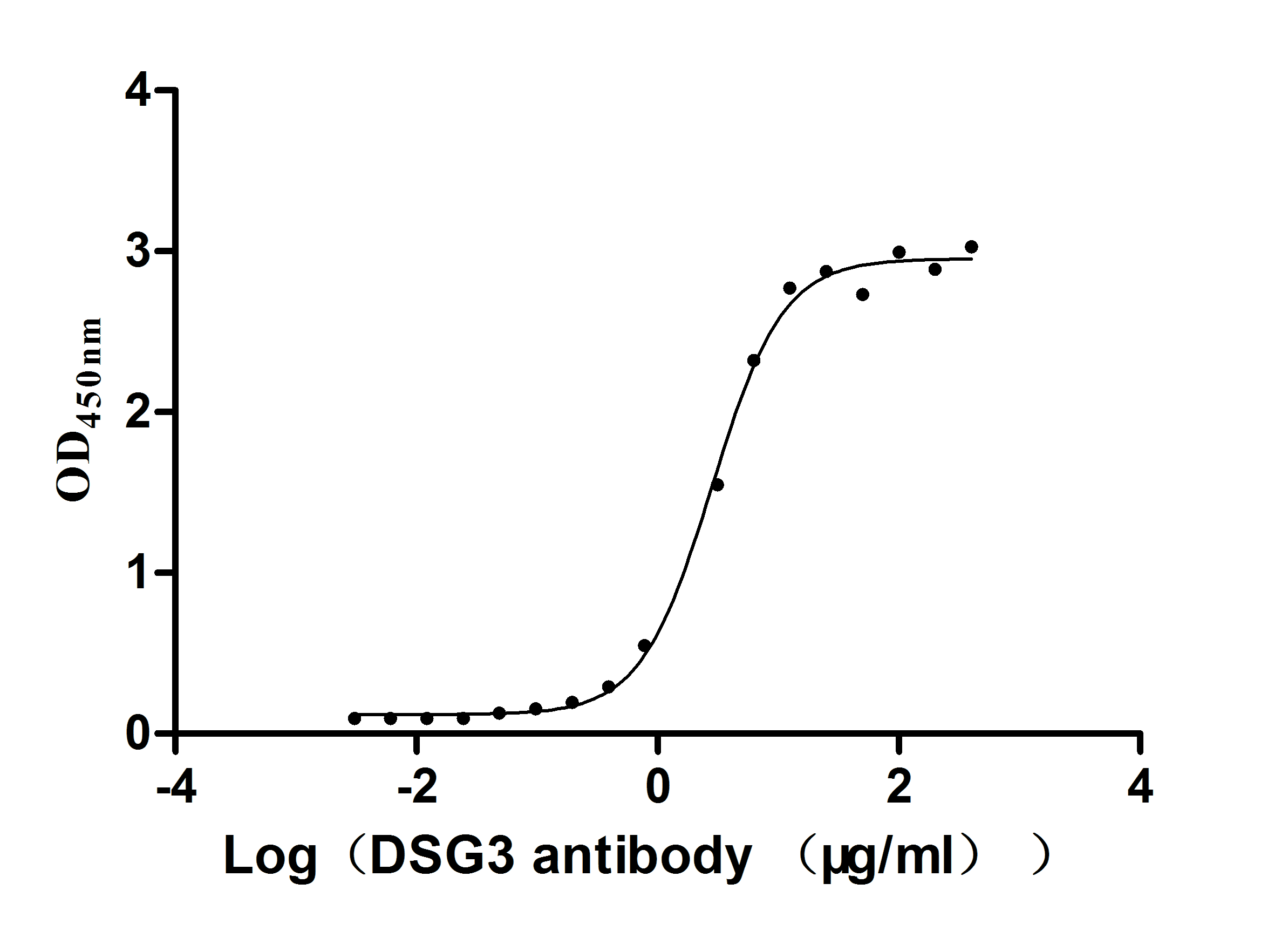
f4-AC1.jpg)
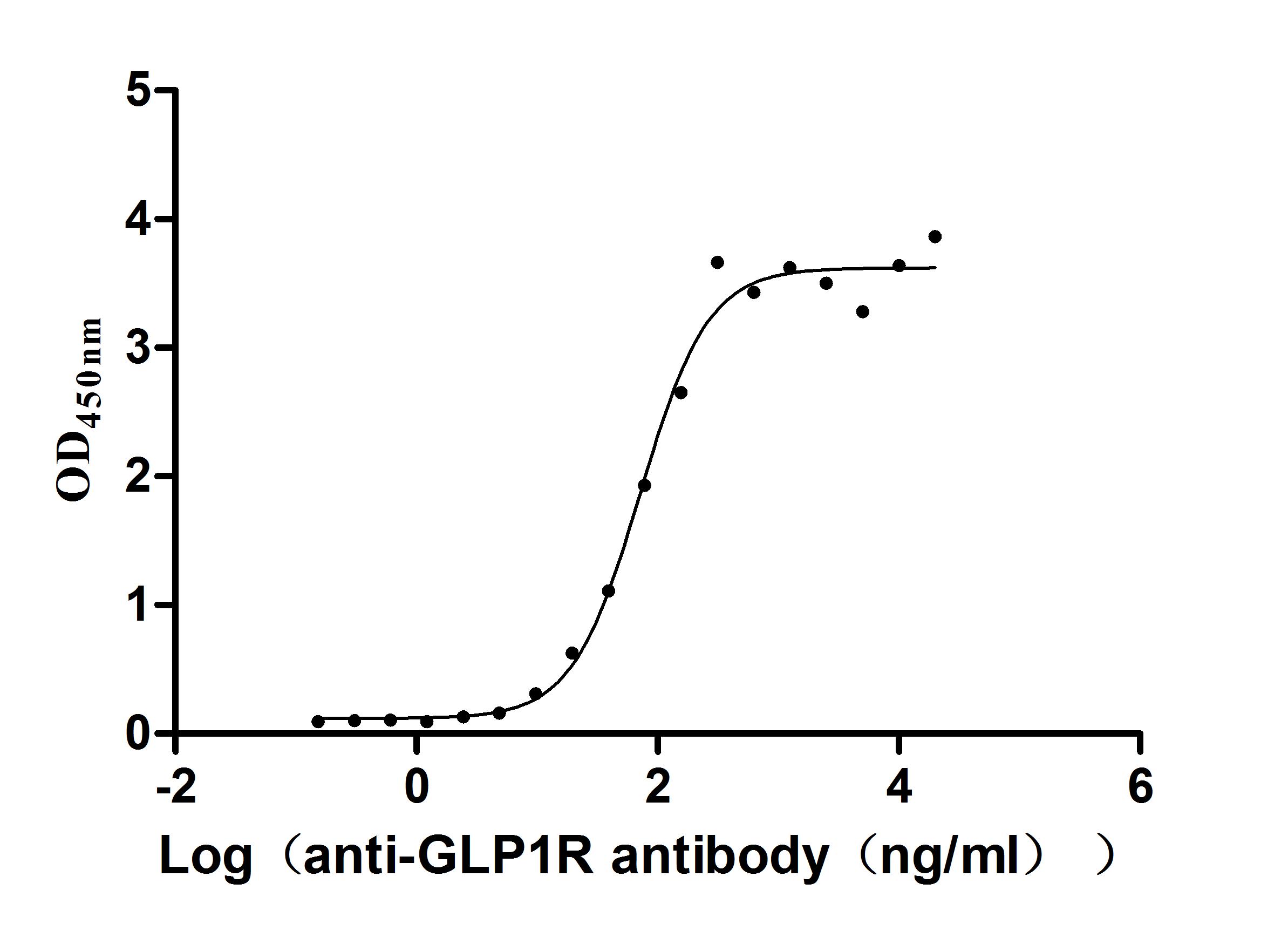
-AC1.jpg)
